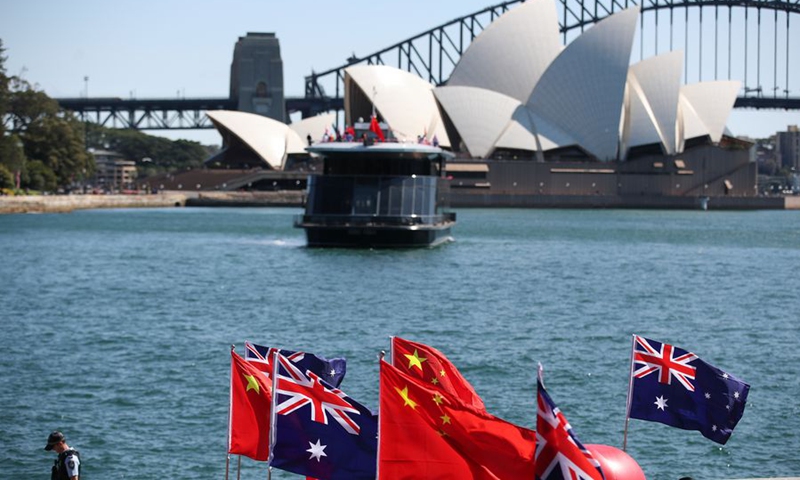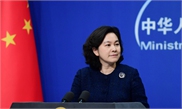
Chinese and Australian national flags are seen at an event in Sydney, Australia. File photo: Xinhua
Australia's claim that China has ignored its request for trade discussions is an attempt to shift the blame for deteriorating China-Australia relations to Beijing, and Canberra is the party that is responsible for distorting bilateral ties, Chinese experts said Monday.
Australian Trade Minister Simon Birmingham, who requested discussions with his Chinese counterpart in May, said Beijing has been ignoring Canberra's pleas, Reuters reported.
Birmingham's call came after China in May partly suspended beef imports from Australia and imposed tariffs on Australian barley - a result of anti-dumping and anti-subsidy investigations into Australian barley that started in 2018.
Beijing has insisted that the decisions on Australian beef and barley came out of concerns over food safety and protecting Chinese barley farmers' legitimate interests, both of which are in accordance with China's laws and WTO rules.
It is notable that since China and Australia established bilateral ties, China only launched one trade remedy investigation (the one on Australian barley), while Australia has launched more than 100 trade remedy investigations against Chinese products, according to Chinese Trade Minister Zhong Shan.
However, Beijing's moves have been interpreted as China's retaliation for Australia's recent request for an independent investigation into the COVID-19 outbreak in China, and a sign of further deteriorating ties.
"Some Australian politicians often follow the US steps on countering China to grab political points, and their offensive moves including its ban on Huawei telecom equipment like 5G, and the COVID-19 investigation, have angered China," a source close to China's foreign policy affairs told the Global Times on Monday.
"Australia is actually the one that has been damaging ties with China, and what Beijing has done is self-defense. The Australian trade minister is trying to shift the blame to Beijing, and for repairing bilateral ties, the ball is now in Canberra's court," the source said.
"Australia wants to please the US while earning money from China. Shouldn't it give a decent explanation for the Huawei ban and its discrimination against Chinese capital before requesting trade talks?" Yu Lei, chief researcher at the Research Center for Pacific Island Countries with Liaocheng University, told the Global Times Monday.
Australia announced on Friday a much tighter investment review policy, regardless of the size of the deal and the ownership of the buyer.
Chinese experts pointed out that in the past decade, a pattern began to emerge in Australia that the Australian government would roll out tighter investment regulations on certain areas when Chinese investment in those areas was active. A pattern of discrimination against Chinese businesses is obvious, they noted.
According to Yu, the new foreign investment law, which could block more Chinese capital from investing in Australia, is despicable because Australia wants unilateral interests - keeping China as its largest export destination - while restricting Chinese capital.
"Australia knows that it does not benefit from the American market the same as from the Chinese market, so it doesn't want to lose the Chinese market," Yu said.
Guo Chunmei, an Australia specialist at China's top international relations think tank, said that consideration of the new investment review process means that Australia is one step further down the road of abusing the notion of national security.
"With its increasingly protectionist moves, people have begun to doubt the sincerity of its commitment to free and open trade and multilateralism," Guo said, commenting on Australia's plan to release a draft of a much tougher new foreign investment review process in July.
Yu, who believes that it's not the right time for China and Australia to hold trade talks, said that the trade talks should only take place when bilateral ties go back to normal when the two sides respect each other's core interests.


